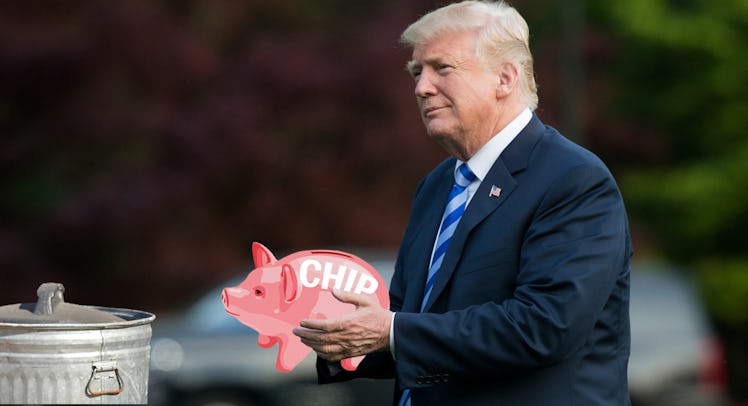Trump’s Plan to Cut CHIP Kneecaps Struggling Parents
Trump is proposing to rescind money from the child health insurance program (CHIP) claiming it won’t have an affect. Here’s why it’s still a bad idea.

Having signed a tax bill lauded by the wealthy that all but guarantees a trillion-dollar budget deficit by 2019, President Trump is now proposing a $7 billion cut in funding for the Child Health Insurance Program, which covers nine million children from low-income families not poor enough to receive Medicaid. The move is an exceptionally mean-spirited attack on the poor. And I should know, I used CHIP to keep my kids covered.
The administration claims that taking back the funds won’t adversely affect the program. Some of the money is “left over” after failing to reach states that administer the program. But another $2 billion comes from a contingency fund meant to cover the program in case of a budget shortfall. Budget shortfall is, for the record, not unlikely. We know this because of the way congressional Republicans dragged their feet on CHIP funding for months, using a program that previously had bipartisan support to extract concessions from weak-willed Democrats.
What do conservative lawmakers have against healthcare for kids from low-income families? Presumably nothing. Presumably, this has to do with “entitlement reform” or, if we’re to be honest, power politics. Either way, turning suffering kids into a political football is beyond callous. Every one of the nine million kids benefiting from CHIP has a parent with a story. Let me tell one of those stories.
I moved my family from Portland, Oregon, to Norwood, Colorado, to help my mother after her husband died of cancer. She was sitting on 80 acres of alfalfa and grass hay that had to be irrigated, harvested, and sold. I felt it was my duty to help.
What my wife and I did not take into consideration at the time was how difficult it would be to find employment in the high country. I did freelance work that provided some income, but it wasn’t enough. We were barely scraping by. Eventually I was able to find work as the editor of the local newspaper while my wife worked for the local health clinic. That was great, but it also meant we needed to find childcare for our kid. We couldn’t afford that and healthcare.
After a few hard conversations, we agreed to seek help. After all we could barely afford groceries. I traveled to the local social services office and applied for food assistance and CHIP. It was a humiliating experience, as it was obviously designed to be. I was a young, college-educated professional and I keenly felt the weight of being on government assistance. Despite the fact that I was working to help my mother and provide my community with its news, I felt like a bad father and husband. I felt less-than.
But none of that really mattered. What mattered is that my kid was covered and we could take him to the doctor. It was a godsend. CHIP provided me with the assurance that I could protect my child, allowing me to focus on my situation and finding a better paying job.
And our situation did, eventually, improve. But I am aware, for some people, the road out of poverty is filled with barriers. Those barriers might be geographical. They might be physical or even racial, but they are there. And the poor throw themselves against those barriers every day. It’s incredibly difficult to do that without the government sawing through the rungs of the ladder. How are people supposed to climb when they have nothing to stand on?
Parents who rely on CHIP aren’t using the program as a free pass. The thought that they are gleefully taking handouts while lazing around is a wicked lie told by politicians to make their base feel better about themselves. And while we claim to be a moral society where everyone looks out for their fellow man, we instead villainize the poor and threaten the health of their children.
If we want to be an upright nation, we should care for those most in need. We should have compassion and empathy for the poor. And we should, at the very least, look out for the health of our children. To do otherwise is simply ugliness.
This article was originally published on